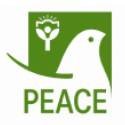
Sustainable Agricultural Land Management (SALM) Project
Overview
The Sustainable Agricultural Land Management (SALM) Project, implemented by PEACE with support from GODREJ, is a transformative initiative promoting climate-resilient agriculture and environmental sustainability among small and marginal farmers. Rooted in the principles of carbon sequestration, soil health restoration, and biodiversity conservation, the project is being executed in Jagdevpur Mandal of Siddipet District, Telangana, benefiting 100 farmers across 100 acres.
SALM is not just an agricultural development program—it is a climate-smart solution that integrates sustainable farming techniques with community resilience, economic empowerment, and global environmental goals like carbon offsetting.
Project Highlights
Location
- Location: 5 villages in Jagdevpur Mandal, Siddipet District, Telangana
- Coverage: 100 farmers | 100 acres
- Project Duration: April 2024 – March 2027 (3 years)
- Status: Ongoing
Objectives
Sustainable
- Promote sustainable agricultural practices that enhance productivity while reducing greenhouse gas emissions.
- Improve soil fertility, water retention, and resilience to climate change.
- Introduce and integrate Innovative farming techniques for potential carbon sequestration.
- Provide livelihood security to smallholder farmers through climate-smart agriculture.
Key Components
Carbon Sequestration
🌱 Carbon Sequestration
- Practices such as agroforestry, cover cropping, and reduced tillage are introduced to capture carbon dioxide from the atmosphere and store it in soil and biomass.
- These methods contribute directly to climate change mitigation and generate potential for carbon credit revenue in the future.
🌿 Soil Health Enhancement
- Application of organic compost, use of green manure, and minimal tillage methods are practiced to improvesoil fertility, microbial activity, and structure.
- These measures increase water-holding capacity and crop resilience in drought-prone conditions.
🌾 Agroforestry Integration
- Trees are intercropped with regular crops, enriching biodiversity, reducing wind erosion, improving soil shade and structure, and providing alternate income sources such as fruits, fodder, and fuelwood.
🐝 Biodiversity Promotion
- By encouraging crop diversity, rotational cropping, and natural habitat creation, the project fosters beneficial insect populations, reduces pest outbreaks, and supports local ecology.
💧 Water Management Techniques
- Adoption of water harvesting, farm ponds, and drip irrigation systems to optimize water use and reduce dependency on erratic monsoons.
🧑🌾 Farmer Training and Capacity Building
- Regular training sessions, awareness workshops, and demonstration plots to empower farmers with knowledge and hands-on skills in SALM practices.
Examples of SALM Practices Promoted by PEACE
Agroforestry
- Agroforestry – Intercropping of trees and shrubs with traditional crops
- Cover Cropping – Use of leguminous cover crops to enrich nitrogen and prevent soil erosion
- Reduced Tillage – Minimal soil disturbance techniques for long-term soil structure preservation
- Composting – Organic waste management through compost pits for soil fertility
- Rotational Grazing – Livestock movement strategies to enhance pasture recovery and reduce land degradation.
Expected Outcomes
Environmental Impact
🔹 Environmental Impact
- Carbon dioxide sequestration through soil and biomass
- Reduced emissions from conventional farming practices
- Biodiversity restoration and improved soil micro-ecology
🔹 Agricultural Productivity
- Higher crop yields through improved soil and water conditions
- Reduced dependency on chemical inputs
- Lower cost of cultivation over time
🔹 Economic Benefits
- Additional revenue potential through carbon credits
- Improved farmer income through value-added crop production
- Diversification of income streams through agroforestry outputs
🔹 Social Impact
-
- Enhanced food security for rural households
- Empowerment of local farmer groups in climate resilience
- Increased community awareness of environmental conservation
Partners
NABARD & GODREJ, Mumbai
- NABARD & GODREJ, Mumbai – Primary sponsor and strategic partner
- PEACE (People’s Action for Creative Education) – Project implementation and community mobilization
- Farmer Clusters – Beneficiaries and active implementers of SALM practices
Conclusion
climate action
The SALM Project stands at the intersection of climate action, sustainable agriculture, and rural empowerment. By introducing eco-friendly, income-generating agricultural models, PEACE is nurturing a generation of climate-smart farmers who are restoring the land, enriching biodiversity, and paving the way for sustainable rural development in Telangana.
Vision and Philosophy Mr. Nimmaiah’s vision is deeply rooted in simplicity, community empowerment, and sustainability. His leadership style emphasizes grassroots involvement, collective action, and resilience in the face of challenges. His philosophy centers around the holistic upliftment of rural communities through participatory methods, sustainable agricultural practices, and education-based interventions.
– Mr. Nimmaiah, Executive Director, PEACE
